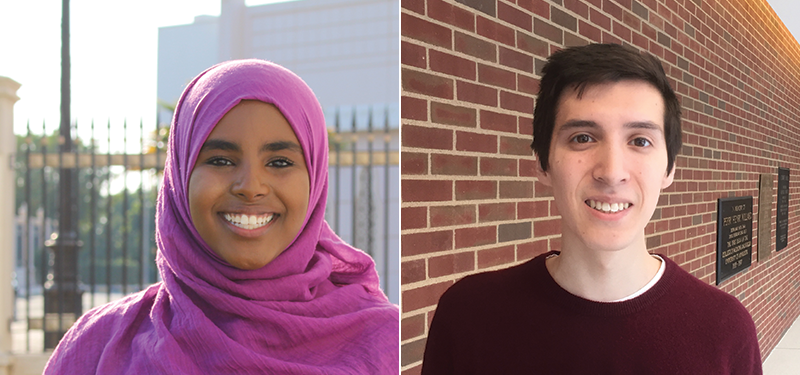CBS undergraduates Sowda Ahmed and Sebastian Swanson plan to explore career options through EXROP research program this summer.

Ahmed (pictured left) and Swanson (pictured right) will take part in research through the EXROP program.
For Sowda Ahmed and Sebastian Swanson, research is more than student rite of passage. Both have spent much of their undergraduate careers getting immersed in research across campus. Sowda previously worked in Dr. Michael O’Connor’s lab and now studies congenital cytomegalovirus under Dr. Mark Schleiss. Swanson started in the Cereal Disease Lab under Dr. Matt Rouse and now researches under Dr. Jeffrey Gralnick, studying the physiology of a Soudan Mine bacterial isolate. While taking advantage of these out-of-class opportunities during their undergraduate career, both wanted to push their research boundaries further.
“I really wanted to immerse myself in an environment where I could learn a lot and have great mentor,” says Ahmed.
With aspirations to dig deeper into research, both Sowda and Sebastian applied for and recently were accepted into the Howard Hughes Medical Institute’s Exceptional Research Opportunities Program (EXROP). A selective 10-week program aimed at increasing the number of leaders from underrepresented backgrounds in science, EXROP participants join HHMI scientists across the nation to take part in intensive research over the summer.
“From being nominated by Robin Wright to receiving the notification of award I have felt incredibly grateful for this opportunity at every step of the way,” says Swanson. “Through this program, I'm hoping to learn about new intersections within molecular biology and develop my research skills in the process.”
While unsure of what field of science they will focus their studies on yet this summer, both Sowda and Sebastian have have particular aspirations of what they hope to pursue. Sowda hopes to eventually work toward a MD/PhD, and hopes to eventually study health issues with the Somali community.
“I realized a lot of the health disparities that affect the Somali community can be thoroughly studied and understood only through research,” says Sowda. “I want to be a leading health disparities researcher. I want to focus on diseases that disproportionately affect African Americans, specifically immigrant populations.”
Swanson knows he enjoys working in the field of molecular biology, and hopes this experience will not only sharpen his research acumen, but also hone his career aspirations.
“This will be a great time to decide if I can see myself being happy in a future career as a scientist,” says Swanson.
-Lance Janssen